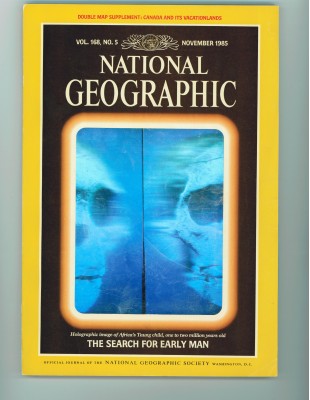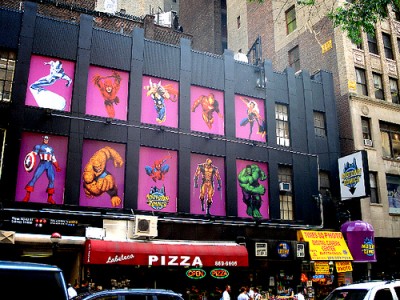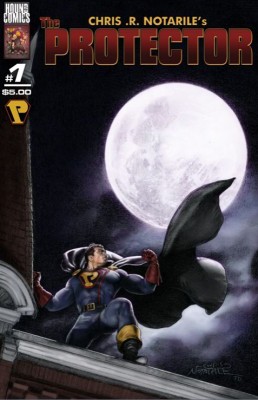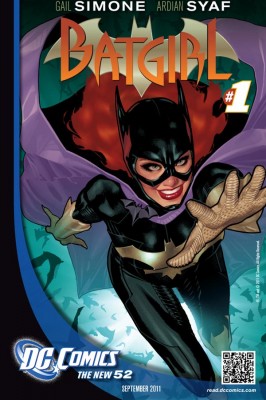

Who, exactly, are the “heroes” of “Comic Store Heroes”?
I’m old enough to remember when the National Geographic brand conjured in the mind images of amazing photos of faraway lands and interesting information about exotic animals, architecture, culture, and conservation. I knew a lot of people who collected the magazine, proudly displaying the spines on ornate bookshelves. The presence of the magazine on your coffeetable was a signal to any visitors that you were an intellectually curious person with good taste and wide-ranging interests.

Just as comic books often publish gimmicky covers to boost sales, so too did National Geographic once release a "hologram" cover in the mid-1980s.
Today, the National Geographic Channel schedules three-hour blocks of television programs in which people hunt for UFOs (it’s balanced, because the team is composed of “one believer, one skeptic, and one undecided”).
Last night, they aired a program entitled “Comic Store Heroes,” which centered around New York City’s Midtown Comics (which is apparently the largest comic book store in America), and the indefatigable fans who shop there.
The program gets off on an unintentionally hilarious note, when Gerry (described as “the Boss” in the Comic Book font chyron), says “We’ve got all kinds of customers here at Midtown…” and then the editors cut to footage of customers perusing the store shelves. Every single white, middle-aged, balding one of them. A customer then notes, without any commentary, that there is a cliche about “the stereotypical nerd-type of comic book fan,” while another fan, dressed as a banana for some reason (when I was about ten years old I had a character called “Gyro Monkey,” and his arch enemy was called “The Big Banana,” and he was a giant banana with legs — but I doubt that’s who this particular fan was referencing) says something self-aware and humorous like “Don’t you wish you were me?” or something. During the same montage, another fan, who also appears to be white and middle aged, wonders aloud (“it just seems odd”) why Cyborg was included as part of the new Justice League.
All of this raises questions that a more intellectually curious documentary might look into: Why are comics fans getting older every year? Why are so many of them middle aged white men? Why did DC choose Cyborg to be part of the new Justice League, and what was the context in which that fan was discussing Cyborg’s inclusion in the Justice League?
Instead, there are a couple of halfhearted swipes at phoneybaloney reality show tension when Gerry assigns his buyer, Alex, with the task of locating a copy of the first issue of Hot Stuff the Little Devil, the comic that got Gerry interested in comics in the first place. Will he find the issue before the end of the hour? Spoiler alert: Who cares?
The marketing guy, Thor, has to ensure that the great Frank Miller, one of the maybe 5 best cartoonists of all time, will be at Midtown’s New York Comic Con booth. Spoiler alert: What the hell is the great Frank Miller doing on this piece of crud show?
There’s also a bit about a cute girl named Zoë who works for the shop, apparently just standing around and looking cute, talking to the “all kinds of customers” who frequent the store and might not otherwise get to talk to a cute girl who knows about comics. This obviously raises other questions — or, maybe I shouldn’t use the word “obviously” in that context because the questions apparently didn’t occur to the creators of this program.
The uninteresting and manufactured dramas at the comic book shop (I haven’t even mentioned the cute girl’s secret admirer who turns out to be Alex, with no explanation or context!) are contrasted with a look into the life of an aspiring comic book creator and a comics fan and blogger. First, the creator, a guy called Chris Notarile. From all the images we see of him, and from all the interviews he does, he appears to be a healthy, young, intelligent man in full possession of all his faculties.
I mention all of these things because it turns out that taxpayers are subsidizing his dream of writing a comic book. Several times he mentions that he’s on food stamps. He’s so focused on his dream that he can’t get a job to buy himself food. This despite the fact that he’s obviously in a position to do so.
I don’t want to get into a political debate, and I don’t begrudge people being on food stamps. I understand that sometimes people fall on hard times, and I think that over all the food stamp program is a good one. When I was growing up, for example, my family was on food stamps for awhile. But there is nothing sympathetic about Mr. Notarile’s plight. He’s apparently childless, healthy, and intelligent. He could get a job. Lots of us get day jobs and then write and draw at night, without expecting money earmarked for people who are going through serious problems. There might be perfectly valid reasons why Mr. Notarile can’t do this, but in the documentary, all we’re told is that he’s on food stamps. As I’ve said, they mention this several times.
It’s clear we’re meant to sympathize with this scrappy young creator willing to do anything to pursue his dream, but all I saw — all the documentary allows us to see — is a spoiled, entitled man who could get a part-time job if he really wanted to.
He doesn’t help his case when he reveals that he’s not even all that interested in comics. During an interview he says:
“The dream is to bring The Protector to life, and, go from this comic character into, ultimately, a feature film.”
Yep, the scrappy young comics creator really just wants to create intellectual property that he can sell to the movies. You can see the results of his efforts here. (Why not check it out — you helped pay for it!)
Do you think it’s more compelling than, for instance, Marvel’s long-rumored Ant Man film?
(Full disclosure: I’m a big fan of Edgar Wright, who I think is the best filmmaker working today, so I am looking forward to anything he does, even if it is part of the Marvel studios film universe.)
By far the most interesting character on the show is the comics fan and blogger Jill Pantozzi, who isn’t introduced until nearly halfway through. When we first meet her, she informs us that she’s gotten a lot of marriage proposals simply by virtue of the fact that she’s a cute girl who reads comics.
Again, why don’t the documentarians care to explore this area?
When we discover that Ms. Pantozzi has muscular dystrophy, her story becomes all the more compelling. She believes that part of why she relates to superheroes is
“[B]ecause you read those stories where somebody gets bitten by a radioactive spider and all of a sudden has these powers, or just some… overnight magical thing happens, and, when I was growing up I kept wishing that I would wake up one day and I would get these crazy powers.”
In particular, Ms. Pantozzi says that she closely identifies with DC Comics’s Oracle character. Oracle of course is Barbara Gordon, who was paralyzed in the Alan Moore-Brian Bolland classic (and controversial) The Killing Joke and as a result was left having to use a wheelchair, like Ms. Pantozzi. She says,
“The best thing about her is she learned how to fight in her wheelchair, which was really, really cool. She’s never let her disability stop her. And I think that’s what a lot of people see in me, for just accomplishing what I have in my life.”
Once again, the documentarians have a wide-open opportunity to explore more questions, and they just let it slide: How does Ms. Pantozzi feel about DC Comics’s “New 52” company-wide reboot, that took Barbara Gordon out of her wheelchair? Does it diminish the character, or is it a more realistic take on it — why would people who live in a world that includes super scientists like Ray Palmer ever have to worry about paralysis? And, even more important than that, what do the constant reboots, reimaginings, retcons, recyclings and etc ad nauseum say about the state of the comics industry, and the ever-aging fans who follow it?
Please compare and contrast Ms. Pantozzi’s story of genuine difficulty and hardship, and the inspiration she gets from superhero stories, and the guy who’s on food stamps while trying to create intellectual property for the movies. One of the great flaws of the documentary is that, it seems, the creators didn’t have the self-awareness to examine this. They spend way too much approving time on the hard work and difficulty that went into the creation of the single issue of “The Protector,” and the short promotional film created for it (it rained one day while they were shooting the video!), and the phoneybaloney tension over whether or not the single issue will make it onto Midtown Comics’s shelves. Spoiler alert: Who cares?
There’s even less excuse for this than we might first think, since during an interview Ms. Pantozzi reveals that she isn’t even a regular shopper at Midtown Comics, and the documentarians pursued her:
I’m sad to say I’m only a casual shopper at Midtown but I adore everyone there. They really are some of the nicest shops around. See, I was living in New Jersey up until the end of last year, so my LCS was Little Shop of Comics in Scotch Plains. And now I’ve almost entirely switched to digital comics so I don’t have the need to go to a physical store all that often.
…
I was approached about two years ago by a production group in the UK called Parthenon. It wasn’t really clear at the point what the show was going to be but I had a general idea. Mostly, they wanted to tell stories about real people who are in love with comics and they wanted to make sure they represented all types. I already knew a few of the people involved and managed to connect them with a few others and we went from there. The crew filmed me at Midtown Comics, my home, my job, NYCC, and hanging out with friends and got a pretty good look at what comics mean to me personally.
Emphasis added because that is yet another question the documentarians could have explored: The tension between comic book publishers and comic book shops over the handling of digital content.
I’m not sure if “Comic Store Heroes” was intended to be a series, the plans for which were scrapped after AMC’s and Kevin Smith’s “Comic Book Men” appeared last year (the world can support multiple shows about rednecks diving into stagnant pools of water and pulling animals out, but two tv shows about comic book shops is just too much), or if it was originally intended to be a longer documentary and they ran out of funding, or if the creators just got bored. Any of those seem like possibilties to me. Whatever is the case, the show was monumentally half-assed and uninspired.
At least the “Chasing UFOs” show has a “skeptic.”
Latest posts by Ricky Sprague (Posts)
- Meet the start-ups that are thriving in the current economic recovery - May 27, 2016
- How a Wonder Woman comic from 1942 led to the Great California Cow Exodus of 2012, maybe - November 28, 2012
- A common-sense approach to restoring economic prosperity - November 19, 2012
- New Philip K. Dick novel too absurd to be believed - September 17, 2012
- My 90 Days, 90 Reasons submission - September 12, 2012
 Print This Post
Print This Post







Looks like we had similar feelings about the show:
http://we-are-in-it.tumblr.com/post/27208361785/comicstoreheroes#notes
True, mr. oyola.
A little context in CSH would have gone a long way. In Jill Pantozzi’s interviews, she mentions that a film crew had been following her off and on for two years, which leads me to believe that at some point they thought they were going to have a series, but then it got scrapped (or seems to have — I can’t find any other episodes on the schedule). So they had to put something together. Why they decided to concentrate on the Midtown Comics people and not Ms. Pantozzi is completely mystifying.
The result was just a whole lot of nothing.
Thanks for much for watching the show and for your thoughtful comments on it. If you’d like to know how I felt about Barbara’s return to her Batgirl persona you should give this a read:
http://www.newsarama.com/comics/oracle-is-stronger-than-batgirl-110606.html
and
http://www.newsarama.com/comics/gail-simone-dicusses-batgirl-and-oracle-110609.html
An Ant-Man movie would be the dreamiest. Hank Pym, drunk, learns to shrink himself.
Jill, thanks for taking the time to read and respond to my post– I’m honored. And, thanks for the links to your essay on Oracle/Batgirl and the interview with Gail Simone, both of which are very much worth reading, in particular the essay. I think that you nailed it with your observation,
“Every hero has a defining moment that makes them who they are. Batgirl didn’t. Oracle did.”
I was never a huge fan of The Killing Joke, but I do think that Barbara Gordon’s evolution into Oracle was one of the more interesting developments in mainstream comics in the modern era.
But, as was pointed out in your interview with Gail Simone, so much of what’s done in comics is marketing. From a story standpoint, yes, Batman already got his “defining moment,” so he could come back after being “barely in the chair long enough to keep the seat warm,” as Simone mentions.
But, from a marketing standpoint — Bruce Wayne is Batman, and Batman is an extremely lucrative piece of intellectual property. So, just as Superman came back after being “dead,” Batman’s going to have a remarkable recovery.
Michael– I’m anxious to see what Edgar Wright does with the character (he turned “Scott Pilgrim Vs the World” into not just one of the best comics-based films of all time, but also into an effective commentary on fandom and adulthood), but I’m far more interested in seeing his new “The World’s End” movie.
http://screenrant.com/the-worlds-end-movie-edgar-wright-comic-con-teaser-poster-2012-robf-188011/